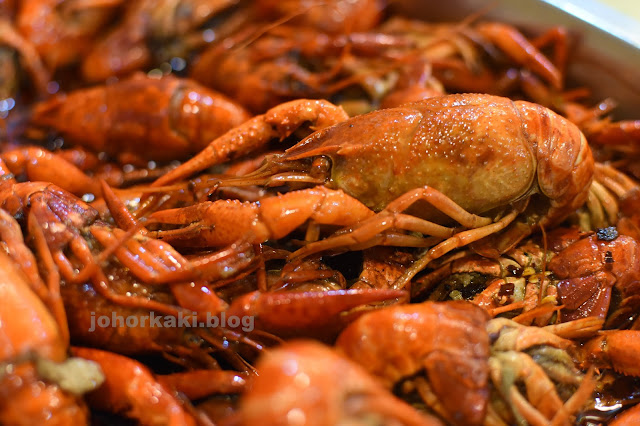
When in Shanghai, it is hard to miss the restaurants, shops and stalls selling xialongxia 小龍蝦 "baby lobsters" or crayfish or yabbies or crawfish. They are everywhere, at every corner you turn especially during the peak crayfish season from May to Sep, coinciding with Shanghai's sizzling, oppressively humid summers.
Less globally famous than their more glamorous crustacean cousin the Shanghai hairy crabs, the humble crayfish is arguably more popular with most Shanghainese.

The crayfish are raised in freshwater farms in nearby Jiangsu 江蘇, Hunan 湖南 and Hubei 湖北.
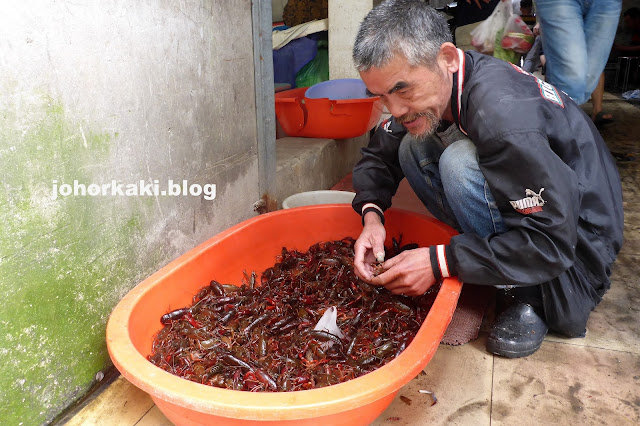
The crayfish are sold live in bathing tubs at fishmongers and supermarkets. Those that I saw ranged from 4 to 6 inches long from the end of the tail to the tip of the head. The bulbous head of the crayfish is more than half the crustacean. Live xiaolongxia reminds me of the attractive colour of red grapes or red wine.

Xiaolongxia were first brought to Nanjing 南京 by the Japanese during the 1930s. The crayfish came to Japan originally from the United States but never really caught on in Japanese cuisine. But, in China, the popularity of crayfish today rival even Louisiana, USA. If you love Louisiana crayfish, you must try the Chinese take on this iconic southern USA dish.

At the shops, the crayfish are usually done in three traditional ways, "Thirteen Spices" 十三香小龙虾, "Aromatic Spicy" 香辣小龙虾, "Numbing Spicy" mala 麻辣小龙虾. There are also stall signatures and more fanciful styles like 啤酒小龙虾 crayfish cooked in beer, 鱼香小龙虾 tangy sweet, so do ask the staff if you like to try more adventurous flavours.

Personally, I prefer the Thirteen Spices 十三香小龙虾 as I found the savoury, spicy and sweet flavours milder and more balanced. The "13 Spices" include nutmeg, cinnamon, sesame seed, peppercorn etc Though named 13 spices, most shops have their secret recipe and use more spices than 13.

Another popular choice, "Aromatic Spicy" 香辣小龙虾 tastes like 13 spices but minus the sweetness, so it leans more to flatter savouriness with mild spiciness.
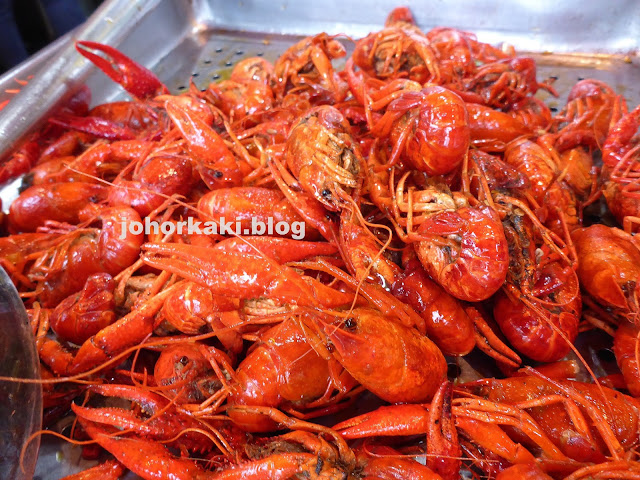
麻辣小龙虾 "mala" is said to be most popular with locals but I haven't tried it yet. Cooked with an overdose of dried chili pepper and peppercorn, it's supposed to be tongue and lip numbing spicy.

There is no elegant way to enjoy xiaolongxia except to use both your hands and all your fingers. The restaurant will provide you thin disposable plastic gloves. The loose skinny gloves keep most of the sauce and grease from your fingers but some will still seep through somehow.

I like licking the flavoursome sauce enveloping the unshelled xiaolongxia but guess that betrays me as a visitor - not from Shanghai 😂

To eat xiaolongxia, first give the huge head a snappy twist and it will pop off easily in an instant. Many Shanghainese suck out the fluid and sauces trapped in the head. It's quite delicious.
Forget about the skinny claws. There is nothing edible or tasty inside. Do not eat anything inside the head, especially the gills, which are filters trapping all the dirt from the river bed.

The locals look at the gills - white gills means the crayfish were raised in clean waters.

Squeeze the not-too-hard shell, pinching inwards from along the sides, breaking it along it's length. Then, peel away the shell and pull or suck the meaty tail out of the red "pants". Break the flesh and dig out the intestine just under the flesh at the top along the spine. Throw away the dark greyish intestine as it is filled with gunk.

Stripped of its head, claws and shell, the xiaolongxia tail is less than half the size of the whole crayfish. It looks like a prawn though not as round. The xiaolongxia tail have bands of deep red colour.

Xiaolongxia have a unique texture slightly more tender and yet have more bounce to the bite compared to prawns. The flesh is sweet like good quality prawn but has it own characteristic taste.
Once you have tasted it, it is easily to understand why these little swimming critters are such a craze in Shanghai.

You can buy cooked crayfish from small street side stalls. This stall sells cooked crayfish at RMB45 per kilo.

This stall at the wet market sells cooked crayfish without heads at RMB50 per kilo.

RMB50 per kilo without head is the cheapest I got for crayfish in Shanghai (in 2016). But, it's served take-away, packed unceremoniously in a plastic box. The crayfish were good but probably not live.

When in Shanghai, you are bound to stumble upon specialist xiaolongxia restaurants, repeatedly.

At restaurants, prices ranges from RMB38 to RMB68 per kilo with head and shell on.
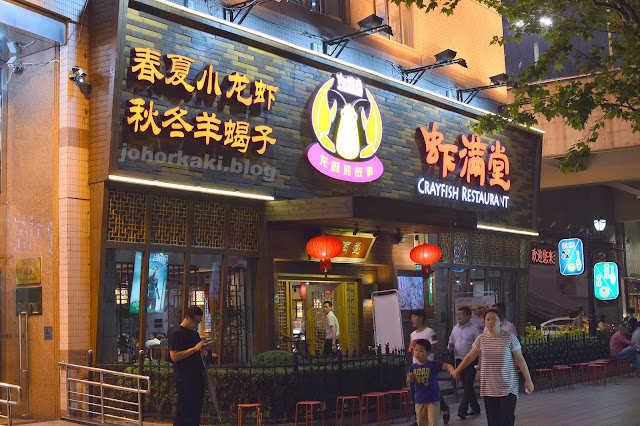
Higher end specialist xiaolongxia restaurants are common in affluent Shanghai. Here, prices start at RMB188 per kilo. The crayfish are live and ingredients are fresh. The chefs in the kitchen are often featured on TV programmes which are proudly streamed on the TV outside the shop to attract customers.

Crayfish shops are dotted all over Shanghai but if you like to visit a street where crayfish restaurants are bunched together, you can try Shanghai's crayfish ground zero at 寿宁路 Shouning Lu. It's an old Shanghai street not too far from the iconic Bund, People's Square and Nanjing East walking street 南京路步行街.

The 寿宁路 Shouning Lu shops are a little gritty but it has a local, authentic feel to it. The grey floors are wet and slimy. With over a dozen xiaolongxia shops jostling for customers along a short 300 metre stretch of grimy street, competition is hotter here than Shanghai's scorching summers. Every shop has its own loyal following, or it has to ship out in double quick time.

👉 When you are in Shanghai, don't stop at xiaolongbao and hairy crabs, give the popular xiaolongxia a try. I've not been to Shanghai long enough (only visited less than 50 days over 5 times) to personally recommend restaurants. But, as long as the crayfish are live and the stated price is at market rate, I think it is a safe bet to try this local dish. I haven't had a bad xiaolongxia experience following these rules.

Nevertheless, for those who rather not to take chances, the two most famous cheap and good xiaolongxia restaurants in Shanghai are the old stalwarts of 寿宁路 Shouning Lu ->
👍 好记龙虾, Shouning Lu shop #32 and #16 is one of Shanghai's crayfish pioneers.

👍 568 香吧岛, with 5 branches at Shouning Lu alone is the xiaolongxia big brother here.

Credit: Screen grab of Google map
Shounning Lu is near the 大世界 Dashijie Subway Line 8 station. Take exit 2 for Jinling Road. (Follow the red arrows in the map.) Head east towards Yunnan South Road. Head south on Yunnan South Road. Yunnan South Road is another famous old food street - there are plenty of old eateries to distract you from your xiaolongxia hunt. At the junction with Shouning Lu, head west. You are now at Shanghai's xiaolongxia ground zero. (You could take a more direct route south via Xizang Road but there won't be much interesting things to see along the main road.)
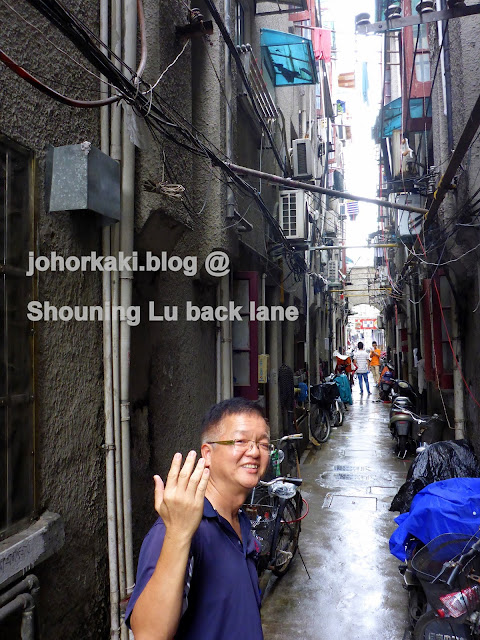
Shouning Lu is an old street worth visiting before it is swallowed up by breakneck speed redevelopment in super prime downtown Shanghai.
Reviewed & updated by Tony Boey on 19 Feb 2021

No comments:
Post a Comment
All comments submitted with genuine identities are published